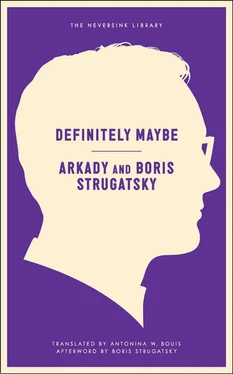“Excellent. Not your joke. I mean the coffee.”
“I got it,” Malianov said glumly.
They silently enjoyed the Viennese coffee. Then Vecherovsky broke the silence.
“I thought about your problem some yesterday. Have you tried Hartwig’s function?”
“I know, I know. I figured that out for myself.”
Malianov pushed away the empty cup.
“Listen, Phil. I can’t think about the damn function! My brain is in a muddle, and you…”
Excerpt 9…. nothing for a minute, rubbing his smooth-shaved cheek with two fingers, and then declaimed:
“We could not look death in the face, they bound our eyes and brought us to her.” Then he added, “Poor guy.”
It wasn’t clear who he had in mind.
“I mean, I can understand everything,” Malianov said. “But that investigator…”
“Want some more coffee?” Vecherovsky interrupted.
Malianov shook his head, and Vecherovsky stood up.
“Then let’s go into my room,” he said.
They moved to his studio. Vecherovsky sat down at his desk, completely bare except for one single piece of paper right in the middle, took a mechanical phone directory from the drawer, pushed a button, read down the page, and dialed the phone number.
“Senior Investigator Zykin, please,” he said in a dry, businesslike voice. “I mean, Zykov, Igor Petrovich. Out on operations? Thank you.” He hung up. “Senior Investigator Zykov is out on operations,” he told Malianov.
“He’s out drinking my cognac with some girls, that’s what he’s out doing,” grumbled Malianov.
Vecherovsky bit his lip.
“That doesn’t matter. The point is he exists!”
“Of course he exists! He showed me his papers. Why, did you think they were crooks?”
“I doubt it.”
“That’s what I thought. To do that whole story just for a bottle of cognac, and right next door to a sealed apartment.”
Vecherovsky nodded.
“And you say—Hartwig’s function! How can I work at a time like this? There’s enough going on.”
Vecherovsky looked at him intently.
“Dmitri,” he said. “Didn’t it surprise you that Snegovoi took an interest in your work?”
“And how! We’d never talked about work before.”
“And what did you tell him?”
“Well, in very general terms—in fact, he didn’t insist on details.”
“And what did he say?”
“Nothing. I think he was disappointed. He said, ‘There’s the estate, and there’s the water.’”
“What?”
“‘There’s the estate, and there’s the water.’”
“And what is that supposed to mean?”
“It’s a literary reference. You know, that you ask about the rope, and you get an answer about the sky.”
“Aha.” Vecherovsky blinked with his bovine lashes, then took a pristine, sparkling ashtray from the windowsill and a pipe and tobacco pouch and began filling the pipe. “Aha… ‘there’s the estate, and there’s the water.’… I like that. I’ll have to remember it.”
Malianov waited impatiently. He had great faith in him. Vecherovsky had a totally inhuman brain. Malianov knew no one else who could come up with such completely unexpected conclusions.
“Well?” he finally demanded.
Vecherovsky had filled his pipe and was now slowly smoking and savoring it. The pipe made little wheezing sounds. Inhaling, Vecherovsky said:
“Dmitri… pf-pf-pf… how much have you moved along since Thursday? I think Thursday… pf-pf… was the last time we talked.”
“What difference does it make?” Malianov asked, annoyed. “I don’t have time for that now.”
Vecherovsky let those words go right by him. He kept looking at Malianov with his reddish eyes and puffed on his pipe. That was Vecherovsky. He had asked a question, and now he was waiting for an answer. Malianov gave up. He believed that Vecherovsky knew better than he what was important and what wasn’t.
“I’ve moved along considerably,” he said, and began describing how he reformulated the problem and reduced it to an equation in vector form and then to an integral-differential equation, how he began getting a physical picture of it, how he figured out the M cavities, and how last night he finally figured out that he should use Hartwig’s transformation.
Vecherovsky listened attentively, without interrupting or asking questions, and only once, when Malianov got carried away, grabbed the solitary piece of paper, and tried to write on the back of it, he stopped him and said, “In words, in words.”
“But I didn’t have time to act on any of it,” Malianov wound up sadly. “Because first the crazy phone calls began, and then the guy from the store came over.”
“You didn’t tell me about any of this,” Vecherovsky interrupted.
“Well, it has nothing to do with it,” Malianov replied. “I could still get some work done with all the telephone calls, but then that Lidochka showed up, and it all went to hell…”
Vecherovsky was completely enveloped in puffs and plumes of honeyed smoke.
“Not bad, not bad,” his soft voice said. “But you stopped, I see, at the most interesting spot.”
“I didn’t stop, I was stopped!”
“Yes,” said Vecherovsky.
Malianov struck his knees with his fists. “Damn, I could be doing so much work right now! But I can’t think! Every rustle in my own apartment makes me jump like a psycho… and then there’s that lovely prospect—fifteen years in a prison camp…”
He brought up the fifteen years yet again, always waiting for Vecherovsky to say “Stop imagining things, that won’t happen, don’t even think about it…” But this time, too, Vecherovsky said nothing of the kind. Instead, he started questioning Malianov at length and in detail about the phone calls: when did they start (exactly), where were they calling (well, just a few concrete examples), who called (man? woman? child?)? When Malianov told him about the calls from Weingarten, he seemed surprised and kept silent for a while, and then went back to his questions. What did Malianov say when he picked up? Did he always pick up? What did they tell him at the telephone repair service? By the way, it was only then that Malianov recalled that after his second call to the repair service that the wrong numbers stopped… But he didn’t have time to tell Vecherovsky about it because he remembered something else.
“Listen,” he said, becoming excited. “I completely forgot. Weingarten, when he called yesterday, wanted to know if I knew Snegovoi.”
“Yes?”
“Yes. I said that I did.”
“And he said?”
“And he said that he didn’t know him. But that’s not the point. What do you think, is it a coincidence? Or what? It’s a strange coincidence.”
Vecherovsky said nothing, puffing on his pipe. Then he went back to his questions. What was the story with the delivery? More detail. What did the guy look like? What did he say? What did he bring? What’s left of the delivery? The monotonous questioning depressed Malianov completely because he couldn’t understand what any of it had to do with his bad luck. Then Vecherovsky finally shut up and poked around in his pipe. Malianov waited and then began imagining how four men would come for him, all in black sunglasses, and how they would search the apartment, pulling off the wallpaper and demanding to know if he’d had relations with Lidochka, and not believing him, and then taking him away.
“What’s going to happen to me?”
Vecherovsky answered.
“Who knows what’s in store for us? Who knows what will be? The strong will be, and the blackguards will be. And death will come and sentence you to death. Do not pursue the future…”
Malianov realized this was poetry only because Vecherovsky lapsed into muffled guffaws that passed for satisfied laughter. That’s probably the sound H. G. Wells’s Martians made when they drank human blood; Vecherovsky guffawed like that because he liked the poem he had just read. One would think that the pleasure he derived from poetry was purely physical.
Читать дальше












